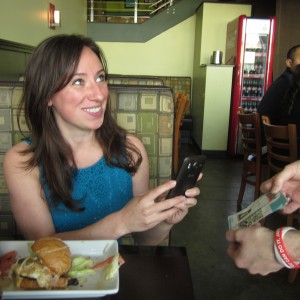For loyalty’s sake: follow the smartphone
 How do you convince coffee shop and pizza parlor owners that it’s time to ditch the paper punch card and move to a digital customer loyalty app? Educate them in the ways of today’s savvy smartphone users.
How do you convince coffee shop and pizza parlor owners that it’s time to ditch the paper punch card and move to a digital customer loyalty app? Educate them in the ways of today’s savvy smartphone users.
Punchkeeper, an app developed by Seattle University MBA Val Trask and her friends, programmer Jon Ohrt and developer Matty Mitchell, does just that. By providing a simple alternative to the old-fashioned paper punch card for businesses like cafes and salons, Punchkeeper ups customer loyalty and downplays wallet space. But wait, there’s more. In the course of any transaction, the app is also collecting valuable market data, performing target marketing through phone notifications, and using geo-locational technology to create social media buzz. What’s not to like?
It is no surprise that early-adopting university students in urban locations are exactly the customers to convince small businesses of Punchkeeper’s benefits. Once store owners learn how simple it is for a smartphone owner to scan a QR code and transmit their data, Punchkeeper becomes an obvious solution. Josh Losinger, the owner of Seattle’s Lunchbox Laboratory, only had to observe his lunch-time customers. “We figured that since most people these days are glued to their phones even while chomping down on our crazy burgers, they may as well get value out of it,” he said. “Punchkeeper is the future of loyalty recognition.”
Since participating in the 2011 UW Business Plan Competition, the Punchkeeper team is now seeking Series A funding to scale and add features. The company currently serves merchants in Washington, Texas and Colorado, and is starting to work with retailers in Oregon and on the East Coast. Punchkeeper has 3,000 users. The team expects that number to grow rapidly with the launch of the University of Washington Housing and Food Services program later this spring.
The biggest lesson Trask and her team have learned? Be scrappy. “At the Business Plan Competition we were the team with the homemade sign, the logo-shaped cookies, the cool borrowed props and the donated giveaways,” explains Trask. “It started us on a path of scrappiness and creativity that translated into successful bootstrapping in the real world.”
Learn more about the world of start-ups via the Center for Innovation and Entrepreneurship at the University of Washington Foster School of Business.
